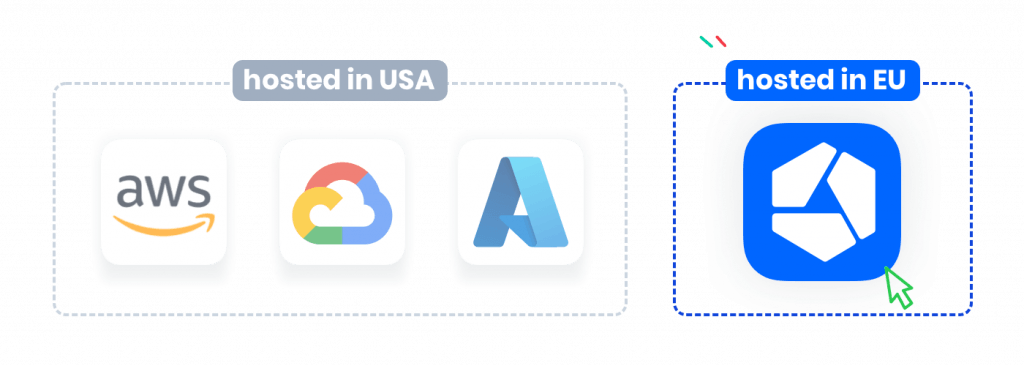Why 72% of European businesses prefer not to store their data in the U.S

Many European business owners and IT experts are concerned about storing data in the U.S. This is evident from a global study - including Belgian insights - by hosting group team.blue, of which Combell is a part. In this article, we dive deeper into the root causes of these concerns and explore why businesses are increasingly opting for local hosting with maximum control.

Download the full report from team.blue
Geopolitical tensions and stricter regulations are making the location of data storage increasingly important. In this report, team.blue shares insights from over 2,000 European companies about their choices and concerns regarding data hosting.
Rising concerns about data security
As geopolitical tensions rise and data security becomes a growing concern, more and more European companies are choosing to keep their data within Europe.
Recent research from team.blue shows that 72% of European organizations are worried about data storage. Business leaders are raising questions about losing control over their data, how foreign laws could affect their operations, and the risk of sensitive information becoming accessible to foreign governments.
One Belgian respondent summarized it as follows:
It’s not always clear what can and can’t be done with our data. It’s troubling that the U.S. government seems to be giving itself more power to access data. Our customers expect data to be stored in Europe, under regulations we can influence.
“Who has access to my data?”
The lack of clarity around who exactly has access to data, and under what conditions, also fuels hesitancy toward foreign cloud services. This increases the pressure on companies when selecting a hosting provider and highlights the importance of transparency and sovereignty in U.S. data governance.
And these concerns are not unfounded. With Donald Trump’s return to the political stage and his outspoken anti-European and unilateral stance, uncertainty grows over how U.S. laws and policies could affect foreign companies.

U.S. Laws vs. European GDPR
One of the biggest stumbling blocks is the U.S. Cloud Act, which requires American tech companies to provide data access to the U.S. government upon request, regardless of where the data is physically stored. This conflicts directly with Europe’s GDPR and puts companies in a legal and ethical dilemma.
With Trump’s re-election, uncertainty is only increasing. His tough stance on Europe and plans to prioritize domestic interests over international agreements - such as controversial import tariffs - raise serious concerns.
For Belgian business owners, one thing should be clear: those who want to protect sensitive data should choose local hosting on European soil.
Marijn Willems, Solutions Sales Specialist at Combell

“Data in U.S. cloud dould end up on a desk in Washington tomorrow”
Geopolitical instability reinforces the distrust of European companies that depend on American hyperscalers like AWS, Microsoft, or Google Cloud.
And it’s precisely this dependence that poses a major risk. As one French cloud provider CEO put it in Politico:
The risk of a U.S. cloud shutdown is the new reality. Cloud is like tap water, but what if one day the tap is turned off?
The Dutch platform Frankwatching puts it even more bluntly: “Everything you store in the U.S. cloud today could be on a desk in Washington tomorrow. It’s not about the flashy AI technology, it’s about the everyday business data you’re putting in there.”
It’s not just the U.S. - Chinese tech also under fire
China is also under increasing scrutiny when it comes to information security. Chinese tech giants like Huawei and Alibaba are being watched closely, with both European and U.S. governments repeatedly expressing concerns about their independence from the Chinese state.
The result? European companies are rightfully looking more and more toward neutral, secure, and local alternatives for their digital infrastructure.

What does this mean for Belgian entrepreneurs?
“For Belgian entrepreneurs, it should now be clear: if you want to protect sensitive data, choose hosting on European soil,” says Marijn Willems, Solutions Sales Specialist at Combell.
“I urge my clients to avoid legal risks, maintain customer trust, and protect their reputation.”
Benefits of local data storage
Local data hosting not only offers peace of mind, but also brings a wide range of tangible benefits, such as:
With local hosting, your data remains governed by European law ensuring full GDPR compliance. It protects your business from foreign legal risks or data seizures.
“Local cloud solutions, like those from Combell, also offer more transparency about who has access to your data and under what circumstances,” says expert Marijn Willems.
Just as important: with local partners, you can act faster and get support in your own language. For many businesses, this makes a big difference in terms of customer service, reliability, and risk management.
As one Chief Information Security Officer put it in response to the team.blue survey:
I’ve moved everything from U.S. companies to Combell. My data in the U.S.? I don’t trust it. Plus, now I’m supporting the European tech industry, not the U.S.
Choose certainty with Combell’s local hosting
At Combell and throughout the team.blue group, we take these geopolitical and legal risks very seriously. That’s why we offer a full range of cloud and hosting solutions entirely within Europe, primarily hosted in Belgium and the Netherlands, in state-of-the-art data centers with ISO certification and strict access controls.
A sample of our local solutions:
- Hosting, VPS, and OpenStack cloud solutions on Belgian soil
- Data protection and GDPR compliance by default
- Managed services with advice and support from local experts
- No dependency on foreign laws
- 24/7 support in your own language
Want to learn more about secure, local hosting?
Our experts are ready to help. Let’s talk or discover how our managed services can bring your business to the local cloud!
Download the full team.blue report
Curious to learn all the insights about data storage and why European companies prefer local hosting?


